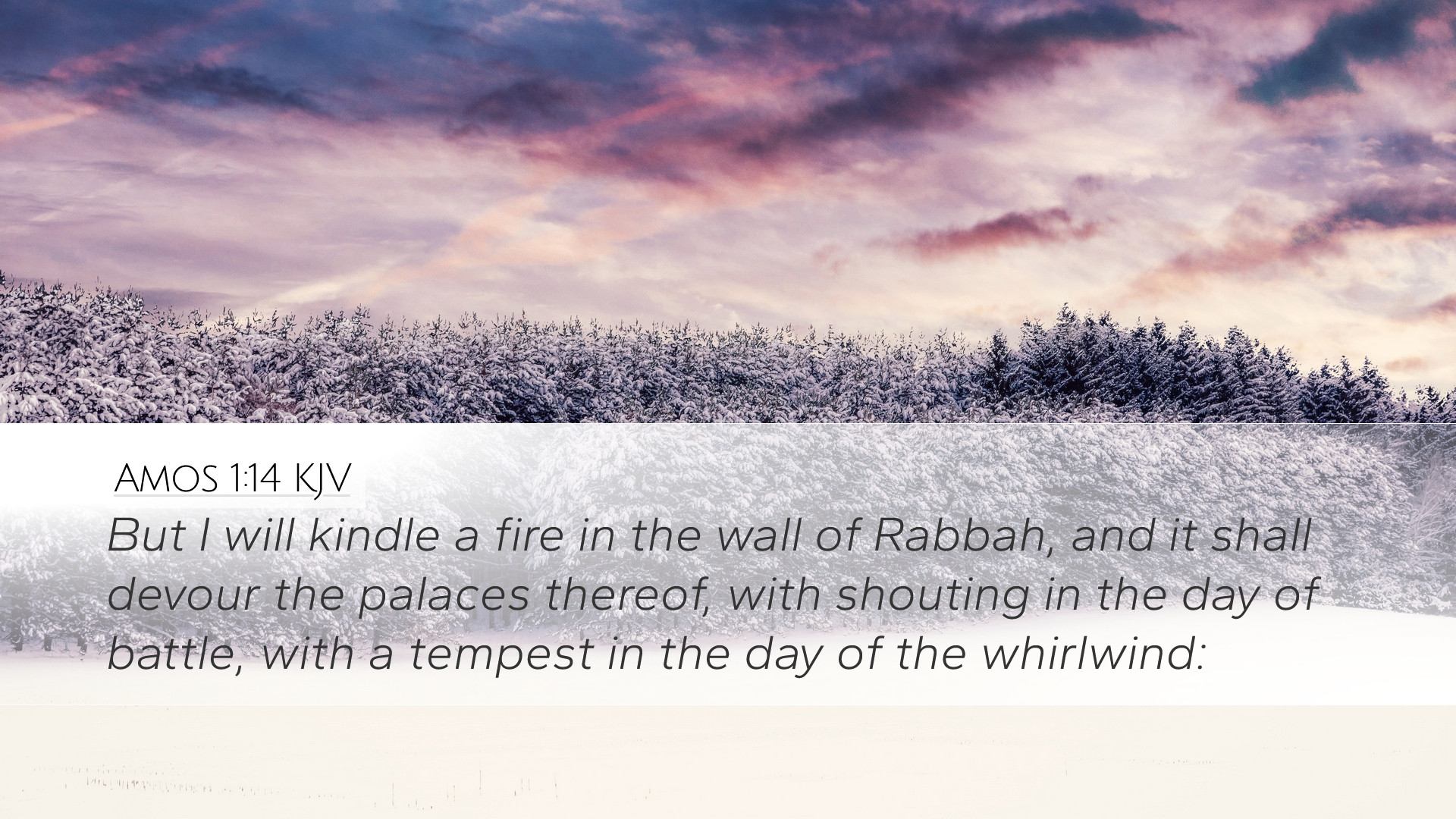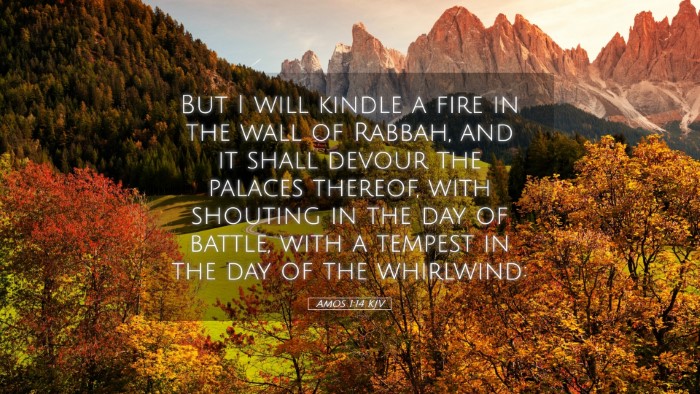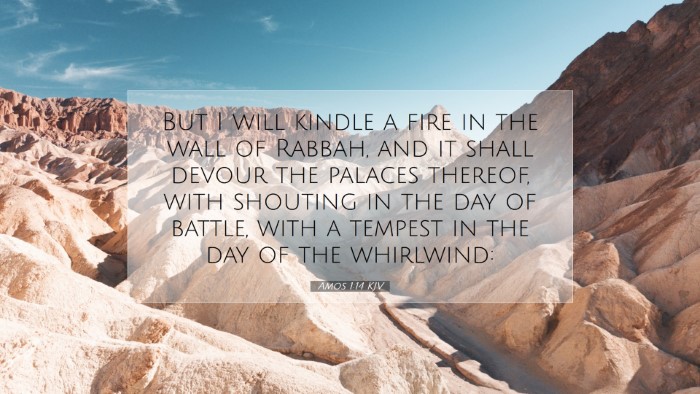Old Testament
Genesis Exodus Leviticus Numbers Deuteronomy Joshua Judges Ruth 1 Samuel 2 Samuel 1 Kings 2 Kings 1 Chronicles 2 Chronicles Ezra Nehemiah Esther Job Psalms Proverbs Ecclesiastes Song of Solomon Isaiah Jeremiah Lamentations Ezekiel Daniel Hosea Joel Amos Obadiah Jonah Micah Nahum Habakkuk Zephaniah Haggai Zechariah MalachiAmos 1:14
Amos 1:14 KJV
But I will kindle a fire in the wall of Rabbah, and it shall devour the palaces thereof, with shouting in the day of battle, with a tempest in the day of the whirlwind:
Amos 1:14 Bible Commentary
Bible Commentary on Amos 1:14
Text of Amos 1:14: "But I will kindle a fire in the wall of Rabbah, and it shall devour the palaces thereof, with shouting in the day of battle, with a tempest in the day of the whirlwind."
Introduction
The Book of Amos, attributed to the prophet Amos, is one of the minor prophetic texts in the Old Testament. Amos spoke during a time of great prosperity in Israel, yet he was also a voice of warning concerning impending judgment due to Israel's social injustices and idolatry.
This particular verse, Amos 1:14, critically addresses the fate of Rabbah, the capital of the Ammonites, a neighboring nation of Israel. The imagery of fire and tempest foreshadows God's judgment and serves as a significant theological reflection for contemporary readers.
Commentary Insights
This section will draw insights from notable public domain commentaries to elucidate the rich theological and practical implications found in Amos 1:14.
Matthew Henry's Commentary
Matthew Henry emphasizes the certainty of divine judgment upon the nations that oppress Israel. His analysis highlights:
- The metaphor of fire signifies destruction and the consuming nature of God's wrath. The "fire in the wall" indicates an internal collapse of the nation's defenses against divine judgment.
- The mention of "shouting in the day of battle" conveys the chaos and turmoil that accompany conflict, suggesting that the destruction will be both swift and thorough.
- Henry draws attention to the historic context of Rabbah, reminding readers that the Ammonites had been enemies of Israel and often positioned themselves against God's people.
Albert Barnes' Notes
Albert Barnes provides a detailed exposition of the prophetic imagery and evident duality in God's judgment:
- Barnes interprets "fire" as both a literal and metaphorical judgment. It serves as a purification process for Israel, while at the same time marking the divine retribution against Rabbah.
- He identifies "the day of battle" and "the day of the whirlwind" as key moments of divine intervention. Such phrases articulate God’s sovereignty and the inevitability of His judgments, drawing connections to Israel and the surrounding nations.
- Barnes underscores that the prophetic declarations serve as warnings not only to the nations threatened but also to the Israelites who witnessed the rise and fall of their neighbors.
Adam Clarke's Commentary
Adam Clarke's interpretation underscores the prophetic authority of Amos and the theological implications of their message:
- Clarke interprets the phrase "kindle a fire" as an unequivocal signal of judgment, indicating that God Himself is the instigator of the calamity that will befall Rabbah.
- He emphasizes the context of the surrounding nations, arguing that the downfall of Rabbah serves as a reminder to Israel of God's overarching control over all nations—as they are not exempt from His judgment.
- Clarke also highlights the psychological impact of the "whirlwind" as a symbol of uncontrollable chaos and destruction, which conveys all the more the swift nature of divine retribution.
Theological Reflections
Drawing insights from the commentaries, several theological themes emerge from Amos 1:14:
Divine Justice
Amos’s pronouncement serves as a vivid testament to God’s justice. The image of consuming fire is not merely a description of physical destruction but encapsulates the moral order that God upholds. It reflects the reality that sin fosters its own destruction. As clergy, students, and theologians reflect on this verse, the dominant theme of divine retribution becomes clear—the God who sees injustice will act decisively against it.
God's Sovereignty
The verse importantly illustrates God's sovereignty over nations. The destruction of Rabbah and the means of their downfall signify that no nation can challenge the will of God without facing dire consequences. Pastors can draw on this theme to remind congregants of God's rulership over all aspects of life, including political and national dynamics.
The Call to Righteousness
As Amos pronounces judgment on Israel's enemies, there is an implicit call to Israel itself. The warnings serve as a reflective piece for the faithful—reminding them that they too must live righteously lest they share in similar judgments. This is invaluable for modern believers, who must engage with the social injustices of their own time.
Conclusion
Amos 1:14 encapsulates powerful themes of judgment, divine sovereignty, and the call to righteousness. By drawing insights from esteemed commentaries like those of Matthew Henry, Albert Barnes, and Adam Clarke, readers can appreciate not only the historical context but also the theological implications of this verse. For pastors, students, theologians, and scholars alike, the analysis of this scripture provides a profound reminder of the holy nature of God and His unwavering commitment to justice.


